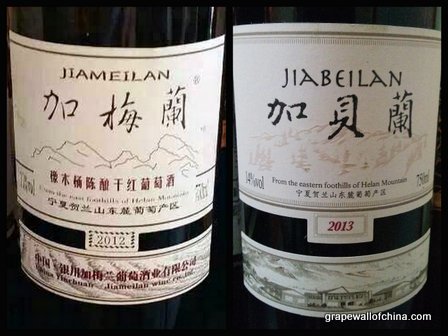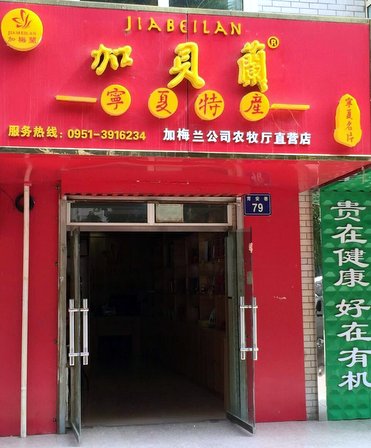
Hey guys, is it just me or do these two wine labels look alike?
The ‘Jia Mei Lan‘ at left, which is apparently a new brand, seems strikingly similar to the ‘Jia Bei Lan‘ at right, which is made by Helan Qing Xue and is well-respected due to a decade of hard work. Yes, it’s somewhat cruder–the mountains look like they were drawn by an eight-year-old whose had a few glasses–but the two labels are too close for comfort in my opinion.
Word is that Jia Mei Lan was made by one of the better wineries in Ningxia, and the buyer received the wine in bottled form and then added the labels, though I have yet to confirm this.
And to be honest, I don’t know the legalities of this situation. Technically, the Jia Mei Lan label may well be within the law. What I do know is the label will likely confuse consumers, who might mistake it for Jia Bei Lan, and leverage the work done by Helan Qing Xue. That strikes me as unfair.
It also makes me think of two bigger issues.
First, I think a label like this would have elicited little reaction a few years ago. Now Ningxia is firmly on the world wine map, Jia Bei Lan is among its most recognizable brands, and the region has a reputation to protect. Rather than this situation being ignored, or remaining between the Jia Bei Lan and Jia Mei sides, it is more likely to spur talk of where the China wine scene is headed and how it will deal with such matters. Given the tough road traveled to build its reputation so far, let’s hope that scene doesn’t hit a speed bump here.
Second, when the foreign media discuss intellectual property rights and wine in China, the perceived victims are invariably imported brands. The reality is the large majority of wine sold in China is produced by local labels and they also face major IPR issues, ranging from conflicts over packaging to registration disputes to outright fakes. Here’s an example from a story I wrote for Wines and Vines:
… Bruno Paumard of Chateau Hansen… says the company sells 90% of its production, which he says reached 2 million bottles last year, in its home province of Inner Mongolia in northern China. This remote market might seem an unlikely target for fake Chinese wines until you consider a handful of Hansen labels sell for $75 or more per bottle, with the newest astronomically priced at $700. That makes refilling bottles with a few dollars of local wine lucrative.
“Our contacts often bring us fake bottles of Hansen they have found in shops in Inner Mongolia, to be analyzed in our lab so we can complain to the authorities,†says Paumard. To slow down the counterfeits, Hansen now uses bottles with the winery’s logo embossed in glass, thus making it more expensive and difficult to copy.
Hansen is just one of many local producers to face challenges, a group that ranges from boutique operations to massive players like Great Wall, as anyone who has seen a bottle of ‘Greet Wall‘ can attest. A huge raid in 2010 in Changli, for example, resulted in three wineries being closed for violating IPR rules, with the victims including Great Wall. Thus, while fake French wines might grab the headlines, the IPR issues faced by local producers is a serious issue.
To return Jia Mei Lan: As mentioned, I don’t know who is legally in the right here. But in terms of fair play, I think the owners have crossed a line by creating market confusion, by piggybacking on the hard work of others, and by raising issues about the maturity of the wine scene.
This feels like an important moment. Just as five years ago, most people scoffed at the idea of quality Chinese wines, and Jia Bei Lan was among those to prove them wrong, perhaps this brand will now be in the midst of a shift in thinking about developing and protecting the country’s promising wine scene.
By the way, a source at Jia Bei Lan says they also have nothing to with this shop:
Sign up for the Grape Wall newsletter here. Follow Grape Wall on LinkedIn, Instagram, Facebook and Twitter. And see my sibling sites World Marselan Day, World Baijiu Day and Beijing Boyce. Grape Wall has no advertisers, so if you find the content useful, please help cover the costs via PayPal, WeChat or Alipay. Contact Grape Wall via grapewallofchina (at) gmail.com.

Leave a Reply
You must be logged in to post a comment.